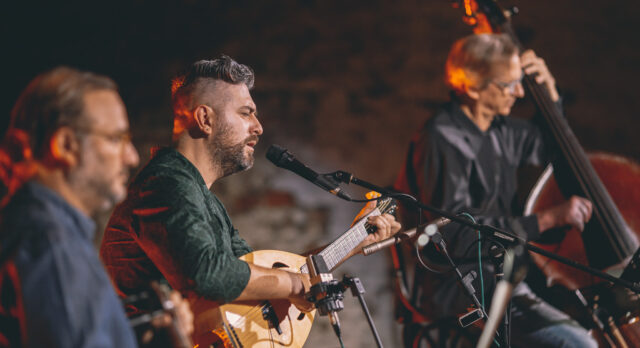Bosnian sevdalinka songs, like flamenco, reggae or blues, were born from the collision of different cultures, in this case Slavic songcraft and Turkish melodic ornaments. Imamović puts the urban subculture that emerged during the Turkish occupation of the Balkans into a new context. He plays a modified guitar, its bulging sound box more reminiscent of a bouzouki or saz lute. He's accompanied by American bassist Greg Cohen, a Tom Waits bandmate, as well as Turkish kemenche violin virtuoso Derya Turkan, a Jordi Savall collaborator. Imamović inserts vocal improvisations between the verses reminiscent of a jazz scat without creating cheap effects, all intertwined with the song's story. Sevdah songs, like Portuguese fado, have been compared to American blues. "If we take into account the social context and the projection of feelings, then there is a parallel," explains Imamović, "both genres are statements about the pain experienced and the desire to overcome it."
Sevdah is originally an Arabic word that penetrated into Bosnia through Turkish, and denotes dark passion, irrational passion and also love. Sevdalinka songs are highly personal and intimate statements with heartfelt emotional singing, originally sung with the accompaniment of the Turkish saz lute. By a tragic coincidence, this genre penetrated the world after the bloody break-up of Yugoslavia. The title of Imamović’s album, Singer Of Tales, was inspired by the book of the same name by Albert Lord, an American professor at Harvard, exploring the continuity of the oral traditions of Eastern Europe with the ancient stories of Homer’s epics. The album won the German Critics Prize. Imamović chooses his repertoire with the knowledge of a literary historian. For example, the ballad Sunce tone (The sun is drowning) is a setting of a poem written by Aleksa Šantić from Mostar. Although it was often performed in communist Yugoslavia, the author’s name was not allowed to be mentioned; the romanticism associated with the bourgeois era of the late 19th century was ideologically unacceptable. The song U Stambolu na Bosforu (In Istanbul on the Bosphorus) is one of the most famous among sevdalinka, popularised half a century ago by singers Himzo Polovina and Zaim Imamović, who was Damir’s grandfather. Sephardic Jews, who found a new home in Bosnia after being forcibly removed from medieval Spain, were also part of the colourful melting pot. Imamović’s repertoire includes the most famous of Sephardic evergreens, Adio Kerida, but his version also includes a verse that is only sung in Sarajevo’s Jewish communities.





















